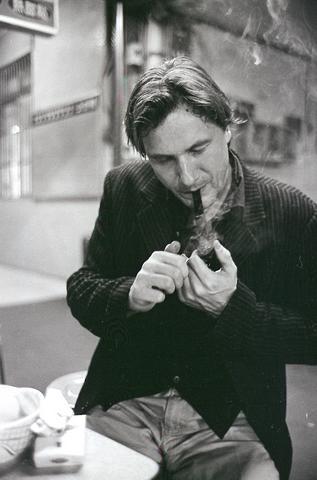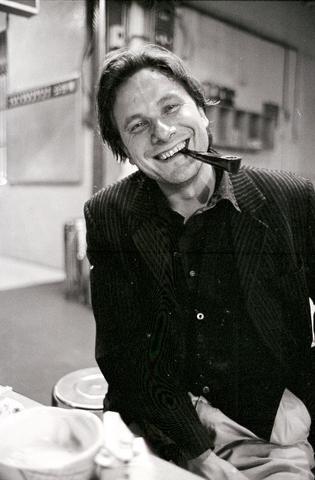At a theater on Taipei's west side, a set piece is being broken down and hauled out to make way for the next production. A couple of stagehands discuss what they'll need for the show, crunching wood shavings underfoot.
It's a scene played out at theaters the world over, but the stage at this theater is among the world's smallest, and its actors -- the ones the audience sees, at least -- are made of wood. It's TTT Puppet Theater (大稻埕偶戲館) and it's the sole puppet theater in a district that once had 10 such venues.

PHOTO COURTESY OF NATALIE FALGARONE
Presiding over the company of puppeteers, wood carvers and lighting and costume designers is Robin Ruizendaal, an 11-year resident of Taiwan and a paradox of a local personality. Though a man holding a puppet isn't often taken seriously, Ruizendaal also holds a wealth of knowledge on Chinese and Taiwanese culture, gleaned from years of research in sinology.

PHOTO COURTESY OF NATALIE FALGARONE
Ruizendaal first began learning Mandarin at 19 and continued his studies at Holland's Leiden University. In the early 1980s, he began research on his doctoral dissertation on Chinese marionette theater. It was a topic that would gain him a kind of access to Chinese culture that few researchers before him had enjoyed.
"I thought [puppet theater] was a nice window to research Chinese society because it's not upper-class culture, it's grassroots culture," he said.
"At the time China was very closed. We didn't know anything about what was happening in the countryside. I thought it was a really interesting, very localized form of art through which I could observe society, because it's related to religion, social groups, theatre, language, music. It had many elements which interested me."
In China, his research followed people associated with the art form from the Republican period in the 1920s, through the Cultural Revolution and up to the 1990s. Among his several observations, Ruizendaal said he learned that the politics of the Chinese Communist Party and the Chinese Nationalist Party were actually very similar.
"The destruction of Chinese religion was high in the priorities of both parties," he said. "I observed China as a religious state where everything is related to religion; everybody lives from house altar to neighborhood altars to temples. What the Communists were doing, as well as the Kuomintang was trying to destroy that element of Chinese culture."
The Communists succeeded in the cities, Ruizendaal said, razing hundreds of temples in Beijing alone.
"But in the countryside where I worked you see the tenacity of religious structure, which was interlinked with social culture so strong that it made an enormous rebound."
"The same thing is happening in Communist China now as happened in Taiwan, with the government initially against theater, banning it for several reasons. ... But in the 1990s there was this turnaround where Communist cadres started supporting theater as a local art, trying to make it function outside the state system."
Was it allowed to be as bawdy an entertainment as it previously had been?
"Yes. You can't get away from sex and shit," he laughs. "Without them, nobody would come."
But Ruizendaal considers Taiwanese puppet culture special compared with its counterparts in China or Japan or other parts of Asia in that it's been popularized in the media.
"Starting in the 1970s, there was an enormous craze for puppet theater -- televised puppet theater -- and so it's really part of the heritage of people in their 40s, 50s and 60s. They all have a warm feeling for puppet theater even though they don't watch it anymore."
The craze continues today, Ruizendaal said, with televised puppet shows and Web sites dedicated to puppets that provide information on each character's biography and birth sign, even their blood type.
"It goes far -- especially among university students," Ruizendaal said.
"It's one of the only forms of art that didn't come from China or Japan or the US. The traditional small puppets come from China, but the big puppets, with their specific Taiwanese lingo, they're a purely Taiwanese art."
And so Ruizendaal's job is as much popularization of puppetry as it is preservation. His main tasks, he explains, are making new plays based on traditional ones, creating a new audience for live puppet theater and promoting it abroad.
TTT works closely with theaters in Cambodia, Myanmar, Indonesia and India.
Last year they toured 12 countries. This year they'll take in five countries, including a second appearance at London's Victoria and Albert Museum.
Despite the considerable attention he's received in local media for his work, Ruizendaal doesn't find it strange that the task of preserving a uniquely Taiwanese art form has fallen to a foreigner.
"I think that, in a global perspective -- in the world of the arts, at least -- the concept of `foreigner' is changing a bit. Maybe not for bus drivers ... but in the arts it's getting quite normal to have conductors from Japan working in Europe. Puppetry is just on the periphery of the arts."
TTT Puppet Theater's upcoming shadow puppet production, The Child in the Rice Paddy (

On April 26, The Lancet published a letter from two doctors at Taichung-based China Medical University Hospital (CMUH) warning that “Taiwan’s Health Care System is on the Brink of Collapse.” The authors said that “Years of policy inaction and mismanagement of resources have led to the National Health Insurance system operating under unsustainable conditions.” The pushback was immediate. Errors in the paper were quickly identified and publicized, to discredit the authors (the hospital apologized). CNA reported that CMUH said the letter described Taiwan in 2021 as having 62 nurses per 10,000 people, when the correct number was 78 nurses per 10,000

As we live longer, our risk of cognitive impairment is increasing. How can we delay the onset of symptoms? Do we have to give up every indulgence or can small changes make a difference? We asked neurologists for tips on how to keep our brains healthy for life. TAKE CARE OF YOUR HEALTH “All of the sensible things that apply to bodily health apply to brain health,” says Suzanne O’Sullivan, a consultant in neurology at the National Hospital for Neurology and Neurosurgery in London, and the author of The Age of Diagnosis. “When you’re 20, you can get away with absolute

May 5 to May 11 What started out as friction between Taiwanese students at Taichung First High School and a Japanese head cook escalated dramatically over the first two weeks of May 1927. It began on April 30 when the cook’s wife knew that lotus starch used in that night’s dinner had rat feces in it, but failed to inform staff until the meal was already prepared. The students believed that her silence was intentional, and filed a complaint. The school’s Japanese administrators sided with the cook’s family, dismissing the students as troublemakers and clamping down on their freedoms — with

As Donald Trump’s executive order in March led to the shuttering of Voice of America (VOA) — the global broadcaster whose roots date back to the fight against Nazi propaganda — he quickly attracted support from figures not used to aligning themselves with any US administration. Trump had ordered the US Agency for Global Media, the federal agency that funds VOA and other groups promoting independent journalism overseas, to be “eliminated to the maximum extent consistent with applicable law.” The decision suddenly halted programming in 49 languages to more than 425 million people. In Moscow, Margarita Simonyan, the hardline editor-in-chief of the